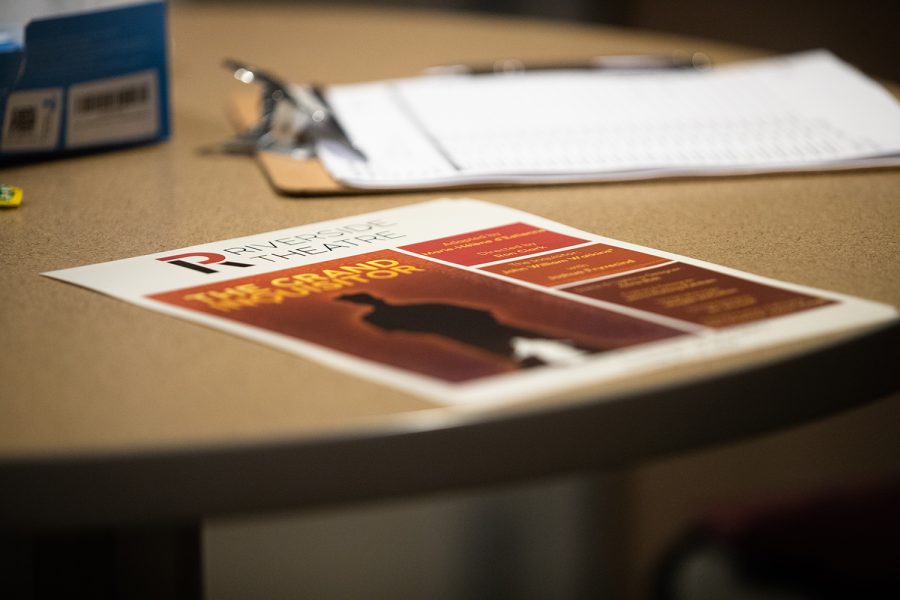Riverside Theatre presents ‘The Grand Inquisitor’ in Main Library exhibit
The play is based off a chapter from Russian novelist Fyodor Dostoevsky’s book ‘The Brothers Karamazov’ and raises intense questions about faith.
A poster for the Grand Inquisitor is seen before the show at the Riverside Theatre in Iowa City Saturday, Oct. 24, 2021.
October 24, 2021
The traditional theater experience is stripped away in Riverside Theatre’s production of The Grand Inquisitor.
After opening last weekend and finishing out performances this upcoming weekend, the monologue is performed in the University of Iowa Main Library’s Dostoevsky at 200 exhibit as part of the Iowa City Book Festival’s programming. Set up as a “tennis-court” arrangement, the audience is surrounded by the history of 1800s Russian novelist Fyodor Dostoevsky.
The Grand Inquisitor is a monologue based on a chapter from the book The Brothers Karamazov, one of many works by Dostoevsky.
The monologue is set in the middle of the Spanish Inquisition, days after the inquisitor orders 100 people to be burned to death as heretics. In the beginning, the character Jesus Christ appears to perform two miracles, only to also be sentenced to death by the inquisitor.
From there, the monologue begins to discuss Dostoevsky’s profound questions about religion, church, and the teachings of Jesus.
Actor John Williams Watkins, who plays the inquisitor, called it a “joyless piece of theater,” because of its thought-provoking intensity and discussion of institutional immorality in the Catholic church.
Watkins has the only speaking role in the entire show, while the character of Jesus Christ sits and listens to his monologue.
“[The Grand Inquisitor] explains how the church has built this institution, this corporation — this means to control the human race,” Watkins said. “He’s not wrong about the points he makes. But what he lacks, I think, is what the Jesus character is filled with, which is free love, faith, and freedom, and giving the human being the option to do good or do bad.”
Though the content of the monologue is joyless, director Ron Clark describes the experience of working with people on set as joyful.
In agreement with Watkins on the subject matter of The Grand Inquisitor, Clark raved about the professionalism and kindness he experienced on set, referring to Watkins as one of the greatest actors he’s ever worked with.
Clark also explained the significance of the monologue taking place in the Dostoevsky at 200 exhibit.
“It’s very exciting to be in there, because you’re surrounded by all the history of Dostoevsky — incredibly scholarly research and visuals that are stunning,” Clark said.
Clark said performing a piece written by Dostoevsky in a designated UNESCO City of Literature is something special, a feeling which is only furthered by The Grand Inquisitor’s collaboration with the Iowa City Book Festival.
Adam Knight, the producing artistic director of Riverside Theatre, said the theater did a production of Uncle Vanya two years ago in collaboration with the Iowa City Book Festival, but unlike Uncle Vanya, The Grand Inquisitor falls under the umbrella of other works featured in the festival, as it deals with Dostoevsky’s work.
“The literary world doesn’t always cross over into the theater world, even though theater is one of the oldest forms of literature,” Knight said. “It provides us a way to expand the conversation, just a way to introduce the work we do to folks who may not have had us on their radar, and vice versa.”
Though the production is free, reservations will be required for this weekend’s performances. Only 40 audience members will be allowed at a time. The production runs 45 minutes with no intermission and can be viewed Thursday, both Friday and Saturday nights, and Sunday afternoon.
“This production is a rare opportunity to see a site-specific production that really brings together greats. We have great literature, we have a great actor, and we have terrific collaborators,” Clark said. “It’s an opportunity to come back and engage in live theater in a setting that is what I call, ‘undeniable theater.’”














